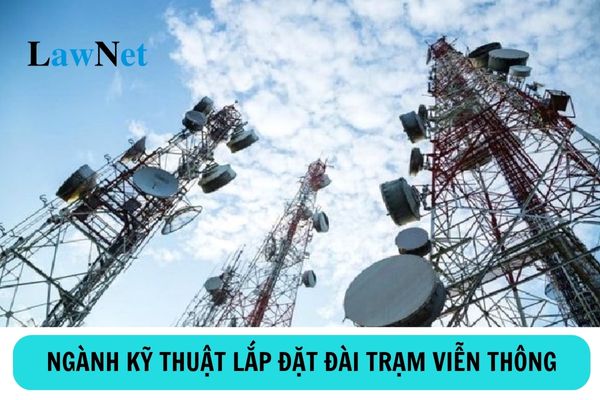What can graduates of the technical college majoring in installing telecommunications stations do after graduation in Vietnam?
What can graduates of the technical college majoring in installing telecommunications stations do after graduation in Vietnam?
Pursuant to Subsection 5, Section A, Part 16 of the Regulation on Minimum Knowledge Volume and Competency Requirements for Students after Graduating from Intermediate Level and College Level in Electrical, Electronics, and Telecommunications Technical Fields (hereinafter referred to as the Regulation) issued together with Circular 48/2018/TT-BLDTBXH, students graduated from Telecommunications Station Installation Engineering can undertake the following jobs:
- Installing infrastructure for telecommunications stations;
- Installing transmission systems for telecommunications stations;
- Installing telecommunication equipment for stations;
- Maintaining telecommunications stations;
- Repairing telecommunications stations;
- Analyzing and designing network systems;
- Installing network systems;
- Maintaining network systems.

What can graduates of the technical college majoring in installing telecommunications stations do after graduation in Vietnam? (Image from Internet)
What are skill requirements for college students in Telecommunications Station Installation Engineering in Vietnam?
Pursuant to Subsection 3, Section A, Part 16 of the Regulation issued together with Circular 48/2018/TT-BLDTBXH, the skill requirements for college students in Telecommunications Station Installation Engineering are as follows:
- Reading design drawings and installing equipment according to drawings;
- Calculating and resolving physical parameters during the installation process of station systems;
- Identifying installation procedures and adhering to safety measures during BTS station installations;
- Applying the 5S management and sanitation model;
- Proficiently using mechanical tools and measuring equipment for installation and inspection;
- Installing monitoring devices, green energy equipment for BTS station systems;
- Installing telecommunications stations, copper and fiber optic cables, telecommunications equipment cabinets, power systems, and other auxiliary equipment;
- Repairing and troubleshooting common electrical and electronic telecommunications equipment faults;- Repairing and troubleshooting cable system issues;
- Using measurement devices for inspection during installation;
- Operating, exploiting devices in telecommunications stations;
- Consulting for projects in the field of telecommunications station installation;
- Verifying results during the installation process;
- Configuring network devices: Switch, Router, Wifi, etc.;
- Setting standard parameters for workstation operating systems and device applications;
- Checking and performing scheduled maintenance on application software as planned;
- Inspecting workstation operations, maintaining all workstation hardware;
- Identifying faults, preparing backup equipment, and replacing damaged equipment;
- Configuring and troubleshooting in small-scale network environments;
- Applying basic information technology per regulations; exploiting, processing, applying IT in specialized work;
- Utilizing basic foreign language skills, achieving level 2/6 in the Vietnamese foreign language competency framework; applying foreign language in specialized work.
What are knowledge requirements for college students in Telecommunications Station Installation Engineering in Vietnam?
Pursuant to Subsection 2, Section A, Part 16 of the Regulation issued together with Circular 48/2018/TT-BLDTBXH, the knowledge requirements for college students in Telecommunications Station Installation Engineering are as follows:
- Understanding regulations and standards regarding technical drawings in the field;
- Describing the functions and usage of mechanical tools and measurement equipment of the profession;
- Presenting the BTS station installation process, adhering to electrical safety and sanitation rules according to 5S standards;
- Presenting foundational knowledge on the installation of telecommunications stations;
- Presenting the operating principles, standards, technical parameters of electrical and electronic telecommunications equipment;
- Explaining the functions, operating principles, and applications of green and clean energy models (solar energy or wind energy, etc.) to supply power to BTS station infrastructure;
- Presenting the functions, operating principles of network equipment;
- Describing the functions, operating principles of remote control and monitoring equipment, and applying new technology software;
- Analyzing, aggregating, and evaluating construction progress;
- Analyzing the pros and cons of similar equipment but from different manufacturers;
- Presenting analysis, data synthesis methods on various technical drawings; methods for accurately determining site locations, device installation positions, milestones related to construction projects, and placing signs at construction sites;
- Illustrating the calculation and selection of copper cables, fiber optic cables, electrical cables; electrical devices, measuring and control equipment, protection instruments, etc., for network projects and BTS stations;
- Analyzing measurement parameters, planning, estimating equipment, manpower, tools, materials, protective equipment for adjusting and handing over network systems and BTS stations;
- Demonstrating the importance of the Internet of Things (IoT) and Industry 4.0 technology in the field of networks and telecommunications;
- Presenting fundamental knowledge about politics, culture, society, law, national defense, security, and physical education per regulations.

